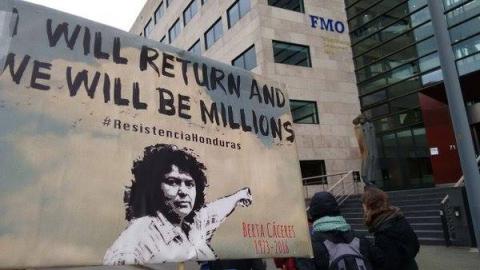
The assassination of environmental and indigenous rights activist Berta Cáceres in Honduras on March 3 brought international condemnation and action. MOGC intern Nicholas Alexandrou contributed to this article, which was published in the May–June 2016 issue of NewsNotes.
On March 10, more than 200 organizations, including the Maryknoll Office for Global Concerns, sent a letter to U.S. Secretary of State John Kerry asking him to “support an independent international investigation led by the Inter-American Commission on Human Rights into Ms. [Berta] Cáceres’ murder and to urge that the Honduran government invite and fully cooperate with such an investigation. Such an independent investigation is essential given the lack of confidence in the judicial system; reigning impunity, including for cases involving human rights defenders; and the emblematic nature of this case, an independent investigation into the assassination of Berta Cáceres.”
Berta Cáceres, winner of the prestigious 2015 Goldman Environmental Prize and founder of the Council of Indigenous and Popular Organizations of Honduras (COPINH), championed efforts to protect indigenous peoples from large-scale development projects that are being advanced in Honduras without consultation of communities and without concern for the environment. She organized communities in Honduras and across the world against the unconsented extraction of natural resources and in defense of the Gualcarque River, a sacred site of the Lenca people and an essential water source, against the construction of the Agua Zarca hydroelectric dam. Berta Cáceres was a much-loved leader of the diverse social movements in her country. Members of Honduran civil society are united in sorrow and anger about her death—as are so many in the international community.
We received a letter in reply from Secretary Kerry on March 30. “The United States strongly condemned this heinous act and called upon the Honduran government to conduct a prompt, thorough, and transparent investigation to ensure those responsible are brought to justice,” Secretary Kerry wrote.
More than 60 members of Congress have written to Secretary Kerry to reiterate the need for an indepentent international investigation. Also, all three of the funders of the Agua Zarca Dam (FMO, Finnfund, and the Central-American Bank for Economic Integration) have suspended financial activities in Honduras.
Sadly, the assassination of Berta Cáceres is not exceptional given the murder rate in Honduras and the prevalence of violence against environmental and human rights activists in Central America. The environmental and human rights organization Global Witness documented the killing of 101 environmental activists in Honduras between 2010 and 2014, making it the most dangerous country in the world for environmental activists.
During a recent panel discussion on Capitol Hill, family members of Berta Cáceres and environmental activists from Honduras accused security forces of protecting the interests of companies rather than communities by criminalizing indigenous lands through forced eviction. Many of the land conflicts between indigenous communities and security forces stem from laws passed after the coup in 2009 that granted 200 mining and 41 hydroelectric concessions which privatized ancestral land. The concessions by the government are in violation of International Labor Organization (ILO) Convention 169 which requires governments to consult with indigenous communities in such land deals.
In an interview with the Intercept, Gustavo Castro, who was wounded during the assassination of Berta Cáceres, said that the sale of electricity and water to factories, industrial parks, infrastructure, and mines is enormously profitable for the government. “Bear in mind that one gold mine can use between 1 and 3 million liters of water every hour,” Castro said.
There remains $750 million in financial aid for the region under appropriations from June to September. The State Department has the ability to withhold up to 50 percent of funding for individual countries, such as Honduras, if they fail to meet a set of conditions including: combating impunity and corruption, protecting human rights, and investigating and prosecuting military and police forces in civilian courts.
“It is essential to show special care for indigenous communities and their cultural traditions,” Pope Francis writes in Laudato Si’. “They are not merely one minority among others, but should be the principal dialogue partners, especially when large projects affecting their land are proposed. For them, land is not a commodity but rather a gift from God and from their ancestors who rest there, a sacred space with which they need to interact if they are to maintain their identity and values. When they remain on their land, they themselves care for it best. Nevertheless, in various parts of the world, pressure is being put on them to abandon their homelands to make room for agricultural or mining projects which are undertaken without regard for the degradation of nature and culture.”
Photo: Demonstration for justice for Berta Cáceres at the building of FMO, one of the funders of the Agua Zarca dam. Photo courtesy of COPINH.
